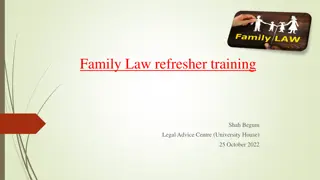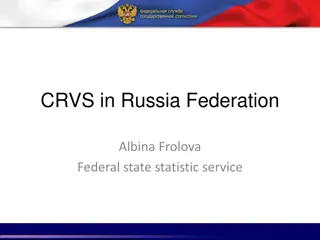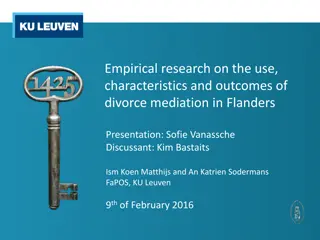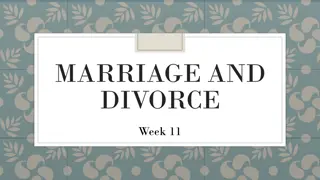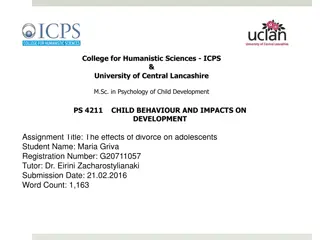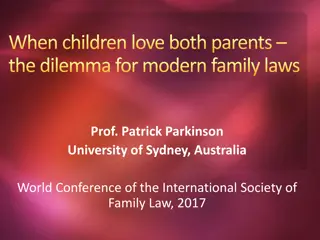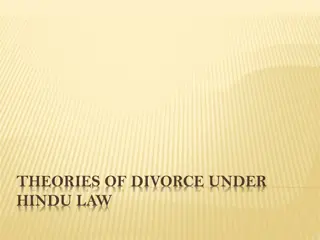Evolution of Family Law: From Divorce Acts to Society's Changes
Explore the evolution of family law through Divorce Acts and societal changes over the past 50 years, analyzing shared jurisdiction, grounds for divorce, and the impact of the Divorce Act of 1968 on social norms and family structures.
Download Presentation

Please find below an Image/Link to download the presentation.
The content on the website is provided AS IS for your information and personal use only. It may not be sold, licensed, or shared on other websites without obtaining consent from the author. Download presentation by click this link. If you encounter any issues during the download, it is possible that the publisher has removed the file from their server.
E N D
Presentation Transcript
FAMILY LAW SEPTEMBER 8, 2020
Shared Jurisdiction over Family Law Federal Govt. Provincial/Territorial Govt. Fed govt has the power to legislate in relation to marriage and divorce Prov govt. has the power to legislate in relation to solemnization of marriage Prov govt. also has the power to legislate in relation to property and civil rights - provs can legislate on property division, support of spouses and children, parenting, guardianship and adoption under this provision Divorce Acts discussed are Federal legislation BC s Family Law Act is provincial legislation dealing with these issues
Changes in Family Law Due to Changes in Society IN THE PAST 50 YEARS: Same-sex couples equality Common-law couples equality Single-parent families more common 1. 2. 3. ~60%+ single female parent families live in poverty (with their children) compared to 10% single male parent families Blended families are more common Couples are having no/fewer children or individuals having children outside of relationships 4. 5.
Divorce Act Federal legislation on Divorce s. 91(26) of Constitution Act, 1867
Divorce Act of 1968 & Social Change Divorce Act of 1968 was the first Fed divorce statute permitting dissolution of marriage if the spouses had lived "separate and apart" for a period of three or five years This was an important first step toward "no fault" divorce
Grounds for Divorce - Divorce Act of 1968 Divorce Act of 1968 imposed uniform stds for divorce on all provs/terr Grounds for petition for divorce were set out in s. 3 and 4 - petitioner had to rely on some notion of fault to obtain a divorce S. 3 granted divorce on grounds for adultery, sodomy, bestiality, rape, bigamy, and physical and mental cruelty S. 4 granted divorce on grounds of imprisonment, addiction to drugs without prospect of rehabilitation, failure to consummate the marriage and varying periods of living separate and apart s. 4(1)(e)(i) divorce could be granted after 3 years of separation if petitioner had been "deserted" - petitioner had to prove intent to desert, proof of living separate and apart and proof of lack of consent to the separation and no just cause for the separation s. 4(1)(e)(ii) divorce could be granted after 5 years of living separate and apart with no requirement of proving desertion
Critics of Divorce Act of 1968 Too restrictive Three and five year separation periods were impractical and resulted in lengthy conflict among parties Grounds for divorce remained tied to fault for marriage breakdown and further intensifying conflict between the parties 1. 2. 3.
The Divorce Act of 1985 This is the latest Divorce Act and it remains in force today (with amendments since 1985) Ministry of Justice noted the following about the Divorce Act of 1985: [S]hortening the separation period to one year from the present requirement of three years is designed to reduce the conflict between the spouses. At the same time, it is considered long enough to allow for second thought, and to avoid rash and hasty divorces, especially since the law will allow for periods of resumption of cohabitation for the purpose of reconciliation without interrupting the period of separation.
Divorce Act of 1985 Divorce Provisions Divorce 8 (1) A court of competent jurisdiction may, on application by either or both spouses, grant a divorce to the spouse or spouses on the ground that there has been a breakdown of their marriage. Breakdown of marriage (2) Breakdown of a marriage is established only if (a) the spouses have lived separate and apart for at least one year immediately preceding the determination of the divorce proceeding and were living separate and apart at the commencement of the proceeding; or (b) the spouse against whom the divorce proceeding is brought has, since celebration of the marriage, (i) committed adultery, or (ii) treated the other spouse with physical or mental cruelty of such a kind as to render intolerable the continued cohabitation of the spouses.
Adultery as a Ground for Divorce: Shaw v. Shaw Facts: W s petition for divorce on the ground of cruelty and H s counter-petition for divorce on the ground of adultery Issue: Whether W committed adultery with Mr. B? Holding: No direct evidence of adulterous relationship bw W and Mr. B (who is also married with kids, denied adultery) but parties are granted divorce on ground of cruelty Rationale: Regarding adultery - It is rarely possible to show direct evidence of adultery so it must be proven on evidence of acts or course of conduct that convinces court of adultery (docs like letters or conduct like close association between parties and mutual passion) *** case illustrates difficulty of proving adultery and leads to the question of whether proof is relevant to a finding of marriage breakdown
Mental or Physical Cruelty as a Ground for Divorce The requirement of proof of mental and physical cruelty is similar to difficulties in proving adultery to obtain a divorce
Knoll v. Knoll Facts: W sought divorce on ground of physical and mental cruelty and evidence at trial was that H became abusive toward her when he drank. Issue: Whether W should be granted divorce on the basis of cruelty? Holding: Yes, the cumulative effect of the acts of H including being drunk, fighting, abusing & insulting W was clear mental cruelty Rationale: Must look at the effect of the conduct complained of upon the mind of the affected spouse. The determination of what constitutes cruelty in a given case depends on circumstances of the particular case, having due regard to the physical and mental condition of the parties, their character, and their attitudes toward the marriage relationship *** case where cruelty was proven but this is rare
S.(J.G.) v. S. (W.O.J) Facts: W sought divorce on ground of physical and mental cruelty because H ignored her, withheld affection/intimacy but had relations with other women Issue: Whether W should be granted divorce on the basis of cruelty? Holding: No, H may have mistreated W but W failed to show how H s conduct was cruelty and rendered cohabitation intolerable for W Rationale: The Divorce Act allows divorce on basis of 1 year separation which will be open to W in time. Applications for divorce on basis of cruelty are rare and party alleging this should have proper evidentiary basis for cruelty *** case illustrates difficulty of proving cruelty
Divorce Act of 1985 and Child Support Child support order 15.1 (1) A court of competent jurisdiction may, on application by either or both spouses, make an order requiring a spouse to pay for the support of any or all children of the marriage https://www.justice.gc.ca/eng/fl-df/child-enfant/2017/look-rech.aspx There are also special and extraordinary expenses
Divorce Act of 1985 and Spousal Support Spousal support order 15.2 (1) A court of competent jurisdiction may, on application by either or both spouses, make an order requiring a spouse to secure or pay, or to secure and pay, such lump sum or periodic sums, or such lump sum and periodic sums, as the court thinks reasonable for the support of the other spouse. Interim order 15.2 (2) Where an application is made under subsection (1), the court may, on application by either or both spouses, make an interim order requiring a spouse to secure or pay, or to secure and pay, such lump sum or periodic sums, or such lump sum and periodic sums, as the court thinks reasonable for the support of the other spouse, pending the determination of the application under subsection (1).
Divorce Act of 1985 and Spousal Support Factors Factors 15.2(4) In making an order under subsection (1) or an interim order under subsection (2), the court shall take into consideration the condition, means, needs and other circumstances of each spouse, including (a) the length of time the spouses cohabited; (b) the functions performed by each spouse during cohabitation; and (c) any order, agreement or arrangement relating to support of either spouse. https://mysupportcalculator.ca/
Divorce Act of 1985 and Spousal Support- Misconduct Spousal misconduct 15.2 (5) In making an order under subsection (1) or an interim order under subsection (2), the court shall not take into consideration any misconduct of a spouse in relation to the marriage.
Divorce Act of 1985 and Spousal Support Objectives Objectives of spousal support order 15.2 (6) An order made under subsection (1) or an interim order under subsection (2) that provides for the support of a spouse should (a) recognize any economic advantages or disadvantages to the spouses arising from the marriage or its breakdown; (b) apportion between the spouses any financial consequences arising from the care of any child of the marriage over and above any obligation for the support of any child of the marriage; (c) relieve any economic hardship of the spouses arising from the breakdown of the marriage; and (d) in so far as practicable, promote the economic self-sufficiency of each spouse within a reasonable period of time.
Divorce Act of 1985 - Spousal Support vs Child Support Priority to child support 15.3 (1) Where a court is considering an application for a child support order and an application for a spousal support order, the court shall give priority to child support in determining the applications.
Divorce Act of 1985 Varying Spousal Support Objectives Objectives of variation order varying spousal support order 17(7) A variation order varying a spousal support order should (a) recognize any economic advantages or disadvantages to the former spouses arising from the marriage or its breakdown; (b) apportion between the former spouses any financial consequences arising from the care of any child of the marriage over and above any obligation for the support of any child of the marriage; (c) relieve any economic hardship of the former spouses arising from the breakdown of the marriage; and (d) in so far as practicable, promote the economic self-sufficiency of each former spouse within a reasonable period of time.
Moge v. Moge, 1992 SCC Facts: H and W separated in 1973 and later divorced after a traditional marriage . W was housewife, Polish immigrant with Gr. 7 education, worked as P/T as cleaner and seamstress during marriage to supplement H income as welder. W continued to care for children and worked as cleaner till she was laid off. She had difficulty finding other work. H remarried, made $2000/mo and purchased home. W obtained $150/mo total spousal and child support. W successfully asked court to vary total support to $400/mo. She worked as a cleaner and made $800/mo compared to H s $2200/mo (with working wife). H applied to vary support and obtained order to cease spousal and child support. W appealed decision to cease spousal support. H argues W should be self-sufficient by the 90s and if she is not, there is no connection between her lack of self sufficiency and the marriage. W argues that self sufficiency is only one of many objectives a court is to look at under s. 17 of Divorce Act and in cases where self sufficiency is not practicable due to residual effects of being outside of labour force for long time. Issue: Whether H could cut spousal support because W was unable to reach self-sufficiency (s. 17 of Divorce Act)? Holding: No, self-sufficiency is only one of four factors to consider under s. 17(7) of Divorce Act Rationale: All 4 objectives under s. 17(7) must be taken into account and no single objective is paramount objective. The court looks at the actual facts of the marriage and spouse s economic status after breakdown (NOT at hypothetical situations such as had W been in a different arrangement with different social and domestic expectations and can t have unreasonable expectations such as this middle-aged housewife upgrading her education, and competing with young people for high paying jobs)
Application of 4 Objectives of Spousal Support Orders s. 17(7) Divorce Act (Moge case) 17(7) A variation order varying a spousal support order should (a) recognize any economic advantages or disadvantages to the former spouses arising from the marriage or its breakdown; W has sustained a substantial economic disadvantage from the marriage or its breakdown (b) apportion between the former spouses any financial consequences arising from the care of any child of the marriage over and above any obligation for the support of any child of the marriage; W s long term responsibility for upbringing of the children of the marriage after the separation had an impact on her ability to earn income (c) relieve any economic hardship of the former spouses arising from the breakdown of the marriage; and W continues to suffer economic hardship as a result of the breakdown of the marriage (d) in so far as practicable, promote the economic self-sufficiency of each former spouse within a reasonable period of time. W has failed to become economically self-sufficient notwithstanding her efforts to be so
Divorce Act of 1985 and Support S. 15.2(6)(d) to 17(7)(d) set out important general principles with respect to claims for spousal support It asserts equality between spouses, basing support on the principle of need and assuming self sufficiency of each spouse "within a reasonable period of time"
Hickey v. Hickey, 1999 SCC Facts: W and H married and divorced in 1987 when H paid $1,000/mo in spousal support and $1,500/mo ($750/child x 2)in child support. 1 child moved out so H asked court for decrease to $1,750 (from $2,500). W agreed regarding child support for that child but asked for increase in support. TJ awarded W $1,300 and son $1,500 ($2,800). H earned annually $220,000 and W earned $30,000. H appealed to Manitoba CA who reduced total support to $1,750. W appealed to SCC Issue: Whether spousal support and child support (1 child) should be increased? Holding: yes, H ordered to pay $2,800/mo in total support Rationale:
Rationale Hickey Child support court looks at increased means of payor, increased needs of child as they grows older and fiscal reality of inflation which in this case justified higher award of child support. Spousal support - court looks at 4 factors in s. 17(7) of Divorce Act : economic disadvantage of former spouse arising from marriage breakdown, financial consequences of child care, economic hardship of former spouse arising from marriage breakdown and promotion of economic self sufficiency of each former spouse For child/spousal support, discretion of trial judge (and their decisions_ is to be respected because TJ is in best position to appreciate all facts in the case and Appeal court should not overturn support order simply because it would balance factors differently because this Creates incentives to appeal Creates expensive litigation Creates delays finality of family law litigation 1. 2. 3. A. B. C.
Miglin v. Miglin, 2003, SCC Facts: H and W married 14 years (in their 40s with 4 kids under 8 years old). They were joint owners of resort lodge. When separating, they signed an agreement where W gave up her interest in the resort lodge for her H s interest in the family home. She thought she could get by on small consulting fee related to resort lodge business and child support so she waived her right to spousal support. W was unable to live on this and asked for court order for spousal support and argued that the agreement was unfair. Issue: Whether agreement was unfair and W can be granted spousal support? Holding: No, the agreement was not unfair in this case and she was not entitled to spousal support but there are other circumstances where a person may be entitled to such relief/court order from the court Rationale: Courts are reluctant to overturn agreements but there are circumstances where a court will amend the terms and allow for spousal support such as when there is significant and unforeseen change in parties financial circumstances; lack of financial disclosure at time of agreement or no counsel
Leskun v. Leskun, 2006, SCC Facts: H and W married and W helped advance H education, by cashing in her RRSPs and obtaining a return of her pension contributions, to support the family leading to major financial problems for W. H left W after obtaining a high paying job in Chicago and found someone else. Issue: Whether spousal misconduct (adultery) is relevant in the consideration of spousal support? Holding: No, spousal misconduct is not relevant UNLESS that spousal misconduct has consequences that effects the other spouse s ability to become sufficient Rational:
Leskun Rationale Court makes a distinction between spousal misconduct (ex. adultery) and the consequences of spousal misconduct consequences may be relevant in determining spousal support S. 15.2(4) requires the court to consider the condition needs and other circumstances when determining spousal support which includes capacity of W to be self-sufficient In this case, W is 59 years old with medical and financial problems court cannot ignore that these difficulties have been exacerbated by the marriage breakdown and is not due to W s self-imposed disability (as argued by the H)
Divorce Act of 1985/Child Custody Order for custody 16 (1) A court of competent jurisdiction may, on application by either or both spouses or by any other person, make an order respecting the custody of or the access to, or the custody of and access to, any or all children of the marriage. Interim order for custody 16 (2) Where an application is made under subsection (1), the court may, on application by either or both spouses or by any other person, make an interim order respecting the custody of or the access to, or the custody of and access to, any or all children of the marriage pending determination of the application under subsection (1). Application by other person 16 (3) A person, other than a spouse, may not make an application under subsection (1) or (2) without leave of the court. Joint custody or access 16(4) The court may make an order under this section granting custody of, or access to, any or all children of the marriage to any one or more persons. Access 16(5) Unless the court orders otherwise, a spouse who is granted access to a child of the marriage has the right to make inquiries, and to be given information, as to the health, education and welfare of the child. Factors 16(8) In making an order under this section, the court shall take into consideration only the best interests of the child of the marriage as determined by reference to the condition, means, needs and other circumstances of the child. Past conduct 16(9) In making an order under this section, the court shall not take into consideration the past conduct of any person unless the conduct is relevant to the ability of that person to act as a parent of a child.


















